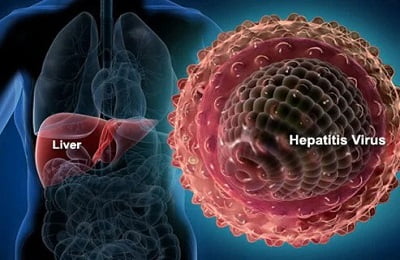Hepatitis
Types of Hepatitis
Viral Hepatitis
Hepatitis A
Transmitted primarily through ingestion of contaminated food or water. It usually resolves on its own and does not cause chronic liver disease.
Hepatitis B
own and does not cause chronic liver disease. -Hepatitis B: Transmitted through contact with infected blood, semen, or other body fluids. It can lead to chronic infection and liver damage.
Hepatitis C
Transmitted through contact with infected blood. It often becomes chronic and can lead to serious liver problems, including cirrhosis and liver cancer.
Hepatitis D
Occurs only in individuals who are infected with hepatitis B. It can accelerate liver damage.
Hepatitis E
Usually spread through ingestion of contaminated water. It is similar to hepatitis A and typically resolves on its own.
Non-viral Hepatitis
Alcoholic Hepatitis
Caused by excessive alcohol consumption, leading to liver inflammation and damage.
Autoimmune Hepatitis
Occurs when the body's immune system attacks the liver, leading to inflammation and liver damage.
Drug-Induced Hepatitis
Some medications, toxins, and herbal supplements can cause liver inflammation.
Symptoms

Acute Hepatitis
Fatigue
Nausea and vomiting
Abdominal pain or discomfort, especially in the right upper quadrant
Loss of appetite
Jaundice (yellowing of the skin and eyes)
Dark urine
Pale-colored stools

Chronic Hepatitis
Often asymptomatic initially but can lead to symptoms of liver failure over time, such as:
Ascites (fluid buildup in the abdomen)
Edema (swelling in the legs and ankles)
Easy bruising or bleeding
Confusion or altered mental state (hepatic encephalopathy)
Spider-like blood vessels on the skin (spider angiomas)
Diagnosis
Blood Tests:
Measure liver enzyme levels, antibodies to specific viruses, and markers of liver function.
Imaging:
Ultrasound, CT scan, or MRI may be used to assess liver size and detect abnormalities.
Liver Biopsy:
A small sample of liver tissue is taken for examination under a microscope to assess the extent of inflammation and liver damage.
Treatment

Hepatitis A
Supportive care, including rest, adequate hydration, and avoiding alcohol and certain medications that can further stress the liver.

Hepatitis B and C
Antiviral medications are available to suppress viral replication and reduce liver damage.

Alcoholic Hepatitis
Abstinence from alcohol is crucial. Corticosteroids may be prescribed in severe cases.

Autoimmune Hepatitis
Corticosteroids and other immunosuppressive medications are used to suppress the immune response.

Drug-Induced Hepatitis
Discontinuation of the offending medication is necessary. Supportive care may be provided.
Prevention
Vaccination:
Vaccines are available for hepatitis A and B and are recommended for individuals at risk.
Practice Good Hygiene:
Washing hands thoroughly, avoiding contaminated food and water, and practicing safe sex can help prevent hepatitis transmission.
Avoiding Alcohol and Risky Behaviors:
Limiting alcohol consumption and avoiding intravenous drug use can reduce the risk of hepatitis.



